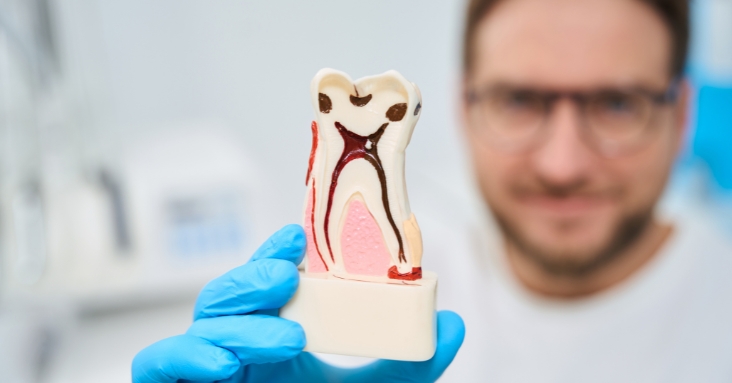Emergency & New Patients Welcome!

A root canal procedure can bring much-needed relief, especially if you’ve been dealing with tooth pain or infection. However, the recovery phase plays a vital role in ensuring the treatment’s success. Following proper aftercare tips for root canal procedures helps speed up healing and prevents complications. By adopting simple practices, you can protect your restored tooth and maintain your overall oral health.
Here are nine essential aftercare tips to follow for a smooth recovery.
9 Aftercare Tips For Root Canal
1. Manage Discomfort with Pain Relievers
It’s common to experience mild discomfort or tenderness after a root canal. Over-the-counter pain relievers, such as ibuprofen or acetaminophen, can help ease any soreness or sensitivity. These medications reduce inflammation and provide relief. Make sure to follow the dosage instructions provided by your dentist to avoid any side effects. If your discomfort persists or becomes severe, don’t ignore it—reach out to your dental office immediately. Prolonged pain might indicate an issue that requires attention.
2. Avoid Chewing on the Treated Side
To protect the treated tooth during the healing period, avoid chewing on that side of your mouth. Chewing can put pressure on the temporary restoration, increasing the risk of damage. Instead, stick to eating softer foods such as scrambled eggs, mashed potatoes, or soup. This precaution reduces the strain on the tooth and helps you recover without setbacks. Once your dentist places a permanent crown, you can gradually resume chewing on both sides.
3. Keep the Area Clean
Oral hygiene is crucial after any dental procedure, especially after root canal treatments. Gently brush and floss as you normally would, taking care not to disturb the treated tooth. Be mindful of the pressure you apply, particularly if you have a temporary crown or filling. Maintaining cleanliness helps prevent infections and supports the healing process. Regular cleaning removes food particles and bacteria, reducing the chance of complications.
4. Follow Dietary Restrictions
What you eat can impact how well your tooth heals. Avoid hard, sticky, or crunchy foods after your procedure. Items like nuts, candies, or chips can strain the treated area and potentially damage the temporary filling or crown. Instead, choose soft, nourishing foods such as yogurt, smoothies, or steamed vegetables. Eating the right foods helps protect the treated tooth and promotes faster recovery. Your dentist will let you know when it’s safe to return to your normal diet.
5. Stay Hydrated
Drinking enough water is a simple yet effective way to aid healing. Staying hydrated helps flush away bacteria and keeps your mouth moist, which promotes recovery. Avoid consuming beverages that are too hot or too cold, as the treated area may be sensitive to extreme temperatures. Additionally, steer clear of sugary drinks, which can promote bacterial growth and lead to complications. Water remains the best option to support your recovery.
6. Use a Saltwater Rinse
Saltwater rinses can work wonders for healing and soothing the treated area. Mix half a teaspoon of salt into a glass of warm water and gently swish it around your mouth for 30 seconds. This natural remedy reduces swelling, cleanses the area, and helps prevent infections. Use a saltwater rinse a few times daily for the first few days after your root canal. This simple practice can provide significant relief and support a smoother recovery process.
7. Be Mindful of Your Temporary Filling or Crown
If you have a temporary filling or crown, extra care is essential. Avoid eating sticky foods like gum or caramel, as these can dislodge the restoration. Similarly, refrain from biting into hard foods, which can cause damage. If your temporary filling or crown becomes loose or falls out, contact your dentist right away. Protecting the temporary restoration ensures the tooth stays safe while you wait for your permanent crown.
8. Avoid Smoking and Alcohol
Smoking and alcohol consumption can interfere with the healing process. Smoking slows down blood flow and increases the risk of infections, while alcohol may irritate the treated area and delay recovery. It’s best to avoid these substances for at least 48 hours—or longer if recommended by your dentist. Prioritizing a healthy environment in your mouth helps the treated tooth heal faster and remain healthy.
9. Attend Follow-Up Appointments
Your recovery process isn’t complete without follow-up care. These appointments allow your dentist to check the treated tooth and make sure it’s healing properly. During your follow-up visit, your dentist will also place a permanent crown if required. Skipping these visits can lead to complications or delays in recovery. Staying proactive with follow-up care ensures your treatment’s long-term success and keeps your oral health in top shape.
Why Proper Aftercare Matters?
Root canal treatments are highly effective for saving natural teeth and relieving pain caused by infection or decay. However, proper aftercare is essential to ensure the treated tooth heals well and remains strong over time. Following these tips not only helps you recover quickly but also safeguards your overall dental health.
By practicing these aftercare tips for root canal recovery, you can enjoy a smooth healing process and avoid unnecessary complications. If you have concerns during your recovery, don’t hesitate to contact your dental office for guidance.
